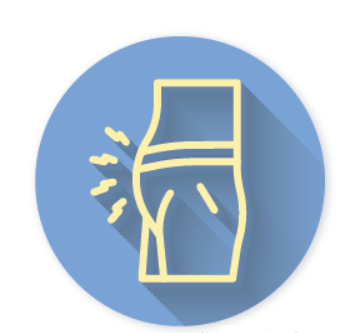For many of us, gas and bloating can be uncomfortable, unsightly, and sometimes embarrassing. Fortunately, there are steps you can take. While underlying medical conditions must be ruled out by seeing your doctor, bloating is often caused by gas. Dietary adjustments may help.
The Main Culprit, Gas. Bloating and distention can occur when gas builds up in the stomach or intestines.
This gas may be caused by swallowing air when you eat or drink, or by production of gas by the bacteria that inhabit your colon. Some foods are higher than others in carbohydrates that are fermented by gut bacteria; one of the end products of the fermentation process is gas. Research suggests gas does not always lead to bloating. Some people’s guts may be more sensitive to the presence of gas than others. Additionally, some research suggests some people have atypical muscle activity that redistributes abdominal gas, leading to visible distension.
Action Steps: Eating slowly and skipping carbonated beverages is often advised to avoid swallowing excess air. Foods that trigger increased gas production in the gut vary by individual. Pay attention to what and when you eat and how you feel, and try to identify the foods that most often cause gas for you. Common culprits include foods high in fermentable carbohydrates, like apples, garlic, onions, cauliflower, wheat, and milk. (See The Low FODMAP Diet, March 2020, for more information.)Replace foods that routinely bother your belly with healthy choices that you tolerate more easily.
Beans are particularly associated with gas production. Many of the fermentable carbohydrates in beans leach out into soaking liquid. When using canned beans, discard the fluid they are packed in; when preparing dried beans, be sure to discard the soaking liquid.
Digestive Issues. Irritable bowel syndrome (IBS) and celiac disease are digestive disorders that may increase gas production, bloating, or sensitivity to gas pain. Constipation can contribute to gas and bloating, as retained stool may make it difficult for gas to pass. Overgrowth or imbalance of bacteria in the colon can also contribute to increased gas production and can increase risk for bloating and discomfort.
Lactose intolerance is a common cause of gas production. Many people lack the digestive enzymes to break down natural milk sugars, sometimes without realizing it. Pay attention to your symptoms after you consume milk or other dairy products.
Action Steps: IBS, celiac disease, and other digestive issues should be diagnosed and treated by a healthcare professional. A breath test can diagnose lactose intolerance, but it is most often self-diagnosed.
If you think you have trouble digesting lactose, try reduced-lactose or lactose-free products, or lactase enzyme tablets. Many people with lactose intolerance can tolerate yogurt and some hard cheeses, because much of the lactose is broken down when these foods are made. If you choose dairy replacements, make certain they are fortified with calcium and vitamin D.
To fight constipation, eat plenty of naturally high-fiber foods like fruits, vegetables, and minimally processed whole grains in place of low-fiber, processed alternatives. Make the switch to high-fiber foods gradually and be sure to increase fluid intake at the same time. Physical activities like walking and yoga may help the digestive process. You may want to ask your doctor or pharmacist if any of your medications increase constipation risk; there may be alternatives.
Rest assured that, while some gas production is inevitable, you can take steps to help reduce bloating and discomfort.
See a doctor to rule out medical conditions requiring treatment if you regularly experience belly bloat, particularly if it is combined with other symptoms such as frequent constipation, diarrhea, or a combination of the two; pain; or ankle swelling.
Identify triggers. Some foods, like dairy, onions, garlic, beans, and cruciferous vegetables (broccoli, cabbage, cauliflower), as well as carbonated beverages are frequent culprits in the production of gas. Replace problem foods with other healthy choices.
Consider lactose intolerance. Milk (and yogurt and cheese to a lesser extent) can cause gas in individuals who lack sufficient enzymes to digest milk sugar (lactose). Lactose-free dairy products, lactase enzymes, or calcium-fortified milk substitutes can help.
Get moving. Physical activity, whether walking, gardening, yoga, or doing household chores, keeps the body and digestive system moving.
Try OTC options. Over-the-counter products, like digestive enzymes, gas-relief capsules, and psyllium supplements to ease constipation may provide some relief. Talk to your healthcare provider before using.
























